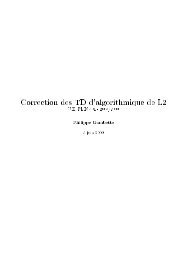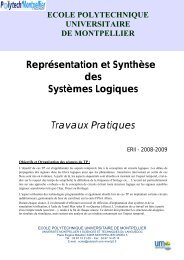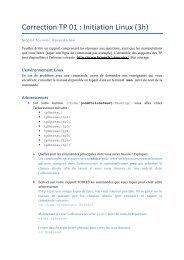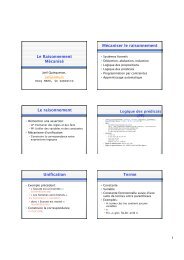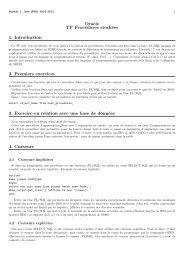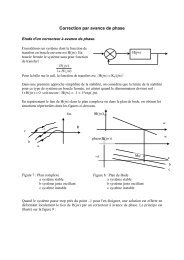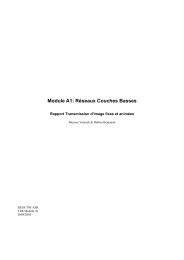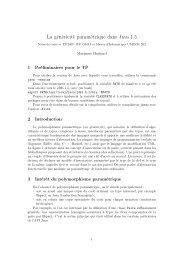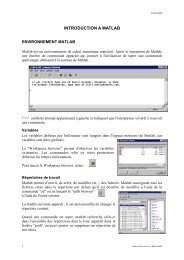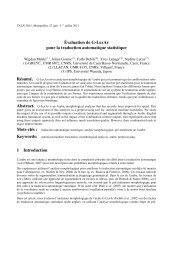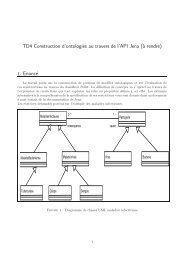Evaluating User Experience in Games: Concepts and Methods - Lirmm
Evaluating User Experience in Games: Concepts and Methods - Lirmm
Evaluating User Experience in Games: Concepts and Methods - Lirmm
Create successful ePaper yourself
Turn your PDF publications into a flip-book with our unique Google optimized e-Paper software.
250 C. Koeffel et al.<br />
calculat<strong>in</strong>g a weighted average. Their score reaches from 0 to 100 <strong>and</strong> can therefore<br />
be seen as a percentage rat<strong>in</strong>g which is very common among review<strong>in</strong>g sites.<br />
Unfortunately, Metacritic.com did not have a rat<strong>in</strong>g for “Die Siedler: Aufbruch der<br />
Kulturen”. Therefore, we gathered 13 different review scores from several review<br />
pages through our own research <strong>and</strong> calculated the average rat<strong>in</strong>g.<br />
The result<strong>in</strong>g rank<strong>in</strong>g of our study can be seen <strong>in</strong> Table 13.2. It shows that the<br />
sequence of the games evaluated accord<strong>in</strong>g to process described above is similar<br />
to the sequence obta<strong>in</strong>ed from Metacritic.com. This tendency shows the connection<br />
between heuristic evaluations <strong>and</strong> user experience (which is the ma<strong>in</strong> focus of the<br />
review from Metacritic). Especially, the rank<strong>in</strong>g accord<strong>in</strong>g to usability issues found<br />
dur<strong>in</strong>g the evaluation appears to comply with the user experience-based results from<br />
Metacritic.com. In relation to the results from Metacritic.com, we can state that the<br />
more the usability issues are found dur<strong>in</strong>g a heuristic evaluation, the worse the user<br />
experience is. The fact that the rank<strong>in</strong>g accord<strong>in</strong>g to po<strong>in</strong>ts is not as high as the rank<strong>in</strong>g<br />
accord<strong>in</strong>g to Metacritic.com can be caused by the fact that our heuristics focus<br />
on usability issues which might not be detected dur<strong>in</strong>g a game review or which<br />
might not be weighted that dramatically. On the other h<strong>and</strong>, we also acknowledge<br />
that the test<strong>in</strong>g time of about 2 hours per game was most likely not long enough to<br />
achieve total immersion. Therefore, certa<strong>in</strong> effects as described <strong>in</strong> Cheng <strong>and</strong> Cairns<br />
(2005) such as overlook<strong>in</strong>g usability issues when be<strong>in</strong>g totally immersed did not<br />
occur. Nevertheless, to further prove this concept more extensive evaluations (with<br />
more games from different genres <strong>and</strong> for longer periods of time) are proposed. This<br />
could also lead to a def<strong>in</strong>ite number of heuristics that have to be fulfilled <strong>in</strong> order to<br />
grant an optimised user experience. In order to comb<strong>in</strong>e research conducted both <strong>in</strong><br />
the area of video games <strong>and</strong> tabletop applications <strong>and</strong> to complete the framework as<br />
<strong>in</strong>troduced <strong>in</strong> this section, Koeffel <strong>and</strong> Haller <strong>in</strong>troduce 10 heuristics for the development<br />
of tabletop games, which are described <strong>in</strong> more detail <strong>in</strong> the next section<br />
(Koeffel <strong>and</strong> Haller 2008).<br />
13.7 A Framework of Heuristics for the Evaluation of a Tabletop<br />
Game’s <strong>User</strong> <strong>Experience</strong><br />
While the heuristics <strong>in</strong>troduced <strong>in</strong> Section 13.6 are very well suited for most video<br />
games such as st<strong>and</strong>ard platform PC or console games, they lack tabletop-specific<br />
aspects. Accord<strong>in</strong>g to Jegers (2008), pervasive games differ <strong>in</strong> many ways from traditional<br />
computer games. This pr<strong>in</strong>ciple also applies to tabletop games, especially<br />
s<strong>in</strong>ce they <strong>in</strong>clude new social <strong>and</strong> physical experiences as described <strong>in</strong> Section 13.1.<br />
Therefore, with<strong>in</strong> this section a set of device-specific heuristics will be <strong>in</strong>troduced,<br />
which <strong>in</strong>clude the social issues as po<strong>in</strong>ted out <strong>in</strong> Jegers (2008), Sweetser <strong>and</strong><br />
Wyeth (2005) as well as particular issues that arise when <strong>in</strong>teract<strong>in</strong>g with a tabletop<br />
game. This section completes the aforementioned framework (see Section 13.6)<br />
with tabletop-specific aspects, some of which might seem similar to other heuristics<br />
<strong>in</strong> the framework at first. Nevertheless, the here selected 10 heuristics are tailored<br />
to tabletop games <strong>and</strong> can profoundly <strong>in</strong>fluence experience as well as the usability




